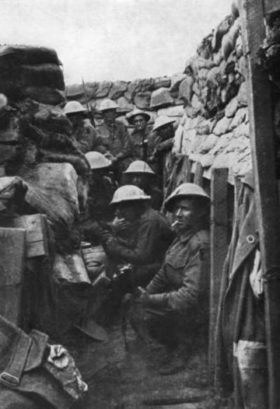After passing over rough ground covered with the bodies of the dead and wounded, strewn with barbed wire and pocked by shellfire, the nineteen-year-old sergeant led his men into a water-filled ditch which had at one time passed for a German trench. Then, as he inadvertently raised his head a bit too high, a bullet quickly found its mark … As he began thrashing about in the water, two of the sergeant’s men grabbed him to keep him from drowning … By strenuous effort and little surgical nicety, the two men managed to apply a field dressing and drag their wounded leader back to their own lines.
This is how author, Robert Linder, describes John Ridley’s introduction to the Battle of Fromelles on page 20 of his book, The Long Tragedy. The young Christian sergeant would suffer the effects of that injury for the rest of his life.
The Battle of Fromelles was the first major battle fought by Australian troops on the Western Front during World War I. It was a devastating time, with the Australian 5th Division suffering 5,533 casualties on 18 and 19 July 1916.
John Ridley recovered from his wounds and returned to active service. He organised a Bible Circle for the 53rdBattalion, and many diggers found faith in Christ as their Saviour. Ridley was awarded the Military Cross for bravery under enemy fire.
A Catholic chaplain, the Reverend Father John J. Kennedy, said of Ridley, ‘He is one of the most perfect Christians I have ever met … Brave as the bravest, cool and manly in action, Jack Ridley was beloved by officers and men.’ (The Whale Oil Guards, p. 119)
After his return to civilian life, John Ridley trained for the Baptist ministry, but suffered significant mental illness because of his wartime experiences. While recovering, he went west with the intention of becoming a jackeroo, but instead he began working as a travelling minister to isolated communities, using a horse-drawn wagon. He was joined in this ministry by his new wife Dorothy, whom he had married in 1926. The pair continued in this work for nine years until the birth of their daughter, Ruth, put an end to their travels.
John Ridley went on to become one of Australia’s most famous and beloved evangelists. (An evangelist is someone who tells others about Jesus and his life and teachings.) Ridley’s preaching was bold, direct, and graphic. In addition to his preaching, he published thirteen books and four volumes of poems. After serving as a chaplain in World War II, he joined others to form the Australian Institute of Evangelism, later known as Ambassadors for Christ International. He died in 1976.
On 14 November 1932, Ridley preached a sermon for which he has become most well-known on the subject of eternity. He preached, ‘Eternity, eternity. I wish that I could sound or shout that word to everyone in the streets of Sydney. You’ve got to meet it: where will you spend eternity?’ His words had a huge impact on one member of the congregation. He was a former alcoholic who had been converted to Christianity two years previously. His name was Arthur Stace. Upon leaving the meeting, Stace found a piece of chalk in his pocket and proceeded to chalk the word Eternity in beautiful copperplate writing on the footpath; an action that he repeated about 500,000 more times over the next 35 years, earning him the nickname, Mr Eternity. He tried writing other words, but was always drawn back to that one word, Eternity.
Thirty-three years after Arthur Stace’s death, the Sydney Harbour Bridge was lit up with the word, Eternity, as part of the celebrations for the beginning of the year 2000. This was done not only to celebrate the achievements of MrEternity, but also to celebrate the new millennium. We can be sure that John Ridley would have approved!
Adapted from material written by Mike Spencer.
Resources:
Article adapted from Mike Spencer, One People, One Destiny: A Christian History of Australia, Southern Cross Educational Enterprises Ltd, 2014
Robert Linder, The Long Tragedy: Australian evangelical Christians and the Great War, 1914-1918, Openbook, 2000
J.J. Kennedy, The Whale Oil Guards, Naval & Military Press, 2009

